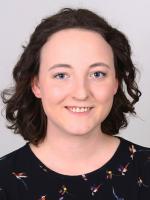
Paula Teeuwen started her PhD in Chemistry in October 2022 at the University of Cambridge in the group of professor J.R. Nitschke. Her PhD is funded through a full scholarship from the EPSRC Centre of Doctoral Training in Automated Chemical Synthesis Enabled by Digital Molecular Technologies (SynTech). In February 2024, she took on professor D.J. Wales as a second supervisor for her PhD project. She obtained her BSc and MSc degrees (both Cum Laude) in chemistry from the Radboud University Nijmegen (2019) and the University of Amsterdam (2022), respectively. Her bachelors project focused on the chiroptical properties of chiral porphyrin cages in the group of Prof. R.J.M. Nolte, with a brief visit to the group of Prof. J. Crassous (Rennes, France). During her masters she combined experimental and theoretical approaches to study electrocatalytic CO2 reduction in rhenium-decorated zirconium metal organic cages (HomKat, UvA) and learned about the photophysics of dipyrrin complexes for photodynamic therapy (Williams, UvA). As part of the Holland Research School of Molecular Chemistry (HRSMC) Class of Excellence, she briefly worked with FeS clusters in the gas-phase (Bakker, HFML-FELIX) and Co/Al2O3 heterogeneous catalysts for K2BO4 hydrolysis (Rothenberg, UvA) as part of two short rotations. In 2017, she was awarded the Young Talent Encouragement Prize Chemistry of the Royal Holland Society of Sciences and Humanities. In 2022, she was awarded the HRSMC Class of Excellence Research Proposal Pitch Prize. Currently, her main research interests are coordination chemistry, supramolecular chemistry, atomistic modelling and the bridging the gap between theory and experiments. In her free time, Paula enjoys meeting up with friends, running, and speed- and inline skating.
Publications
- Page 1

